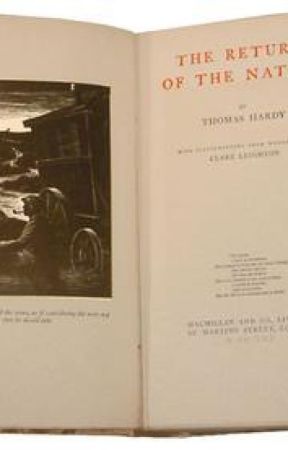On that evening the interior of Blooms-End, though cosy and comfortable, had been rather silent. Clym Yeobright was not at home. Since the Christmas party he had gone on a few days' visit to a friend about ten miles off.
The shadowy form seen by Venn to part from Wildeve in the porch, and quickly withdraw into the house, was Thomasin's. On entering she threw down a cloak which had been carelessly wrapped round her, and came forward to the light, where Mrs. Yeobright sat at her work-table, drawn up within the settle, so that part of it projected into the chimney-corner.
"I don't like your going out after dark alone, Tamsin," said her aunt quietly, without looking up from her work. "I have only been just outside the door."
"Well?" inquired Mrs. Yeobright, struck by a change in the tone of Thomasin's voice, and observing her. Thomasin's cheek was flushed to a pitch far beyond that which it had reached before her troubles, and her eyes glittered.
"It was HE who knocked," she said.
"I thought as much."
"He wishes the marriage to be at once."
"Indeed! What—is he anxious?" Mrs. Yeobright directed a searching look upon her niece. "Why did not Mr. Wildeve come in?"
"He did not wish to. You are not friends with him, he says. He would like the wedding to be the day after tomorrow, quite privately; at the church of his parish—not at ours."
"Oh! And what did you say?"
"I agreed to it," Thomasin answered firmly. "I am a practical woman now. I don't believe in hearts at all. I would marry him under any circumstances since—since Clym's letter."
A letter was lying on Mrs. Yeobright's work-basket, and at Thomasin's words her aunt reopened it, and silently read for the tenth time that day:—
What is the meaning of this silly story that people are circulating about Thomasin and Mr. Wildeve? I should call such a scandal humiliating if there was the least chance of its being true. How could such a gross falsehood have arisen? It is said that one should go abroad to hear news of home, and I appear to have done it. Of course I contradict the tale everywhere; but it is very vexing, and I wonder how it could have originated. It is too ridiculous that such a girl as Thomasin could so mortify us as to get jilted on the wedding day. What has she done?
"Yes," Mrs. Yeobright said sadly, putting down the letter. "If you think you can marry him, do so. And since Mr. Wildeve wishes it to be unceremonious, let it be that too. I can do nothing. It is all in your own hands now. My power over your welfare came to an end when you left this house to go with him to Anglebury." She continued, half in bitterness, "I may almost ask, why do you consult me in the matter at all? If you had gone and married him without saying a word to me, I could hardly have been angry—simply because, poor girl, you can't do a better thing."
"Don't say that and dishearten me."
"You are right—I will not."
"I do not plead for him, Aunt. Human nature is weak, and I am not a blind woman to insist that he is perfect. I did think so, but I don't now. But I know my course, and you know that I know it. I hope for the best."
"And so do I, and we will both continue to," said Mrs. Yeobright, rising and kissing her. "Then the wedding, if it comes off, will be on the morning of the very day Clym comes home?"
"Yes. I decided that it ought to be over before he came. After that you can look him in the face, and so can I. Our concealments will matter nothing."
Mrs. Yeobright moved her head in thoughtful assent, and presently said, "Do you wish me to give you away? I am willing to undertake that, you know, if you wish, as I was last time. After once forbidding the banns I think I can do no less."

YOU ARE READING
The Return of the Native (Completed)
ClásicosThe Return of the Native is Thomas Hardy's sixth published novel. It first appeared in the magazine Belgravia, a publication known for its sensationalism, and was presented in twelve monthly installments from January to December 1878. Because of the...
